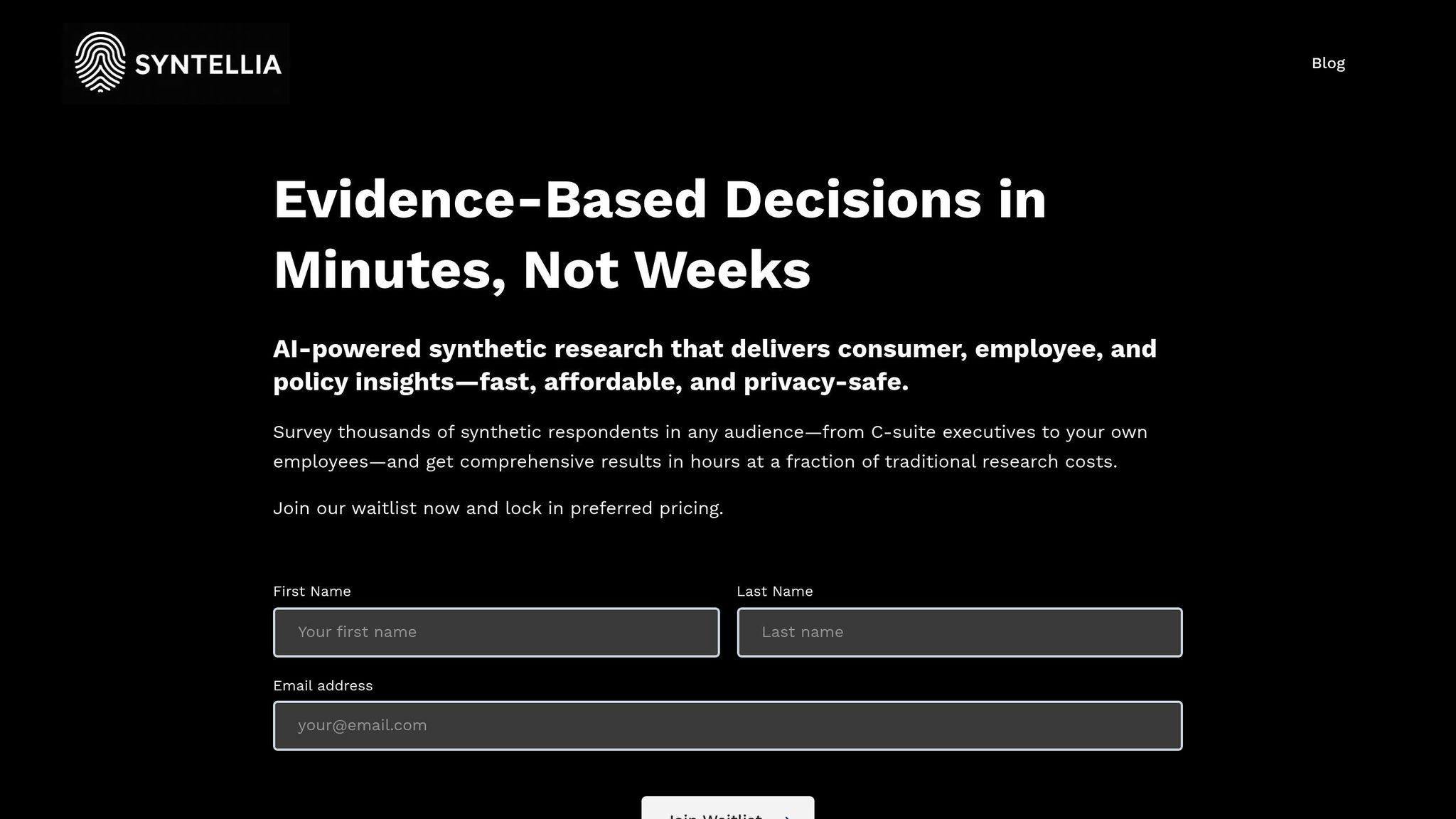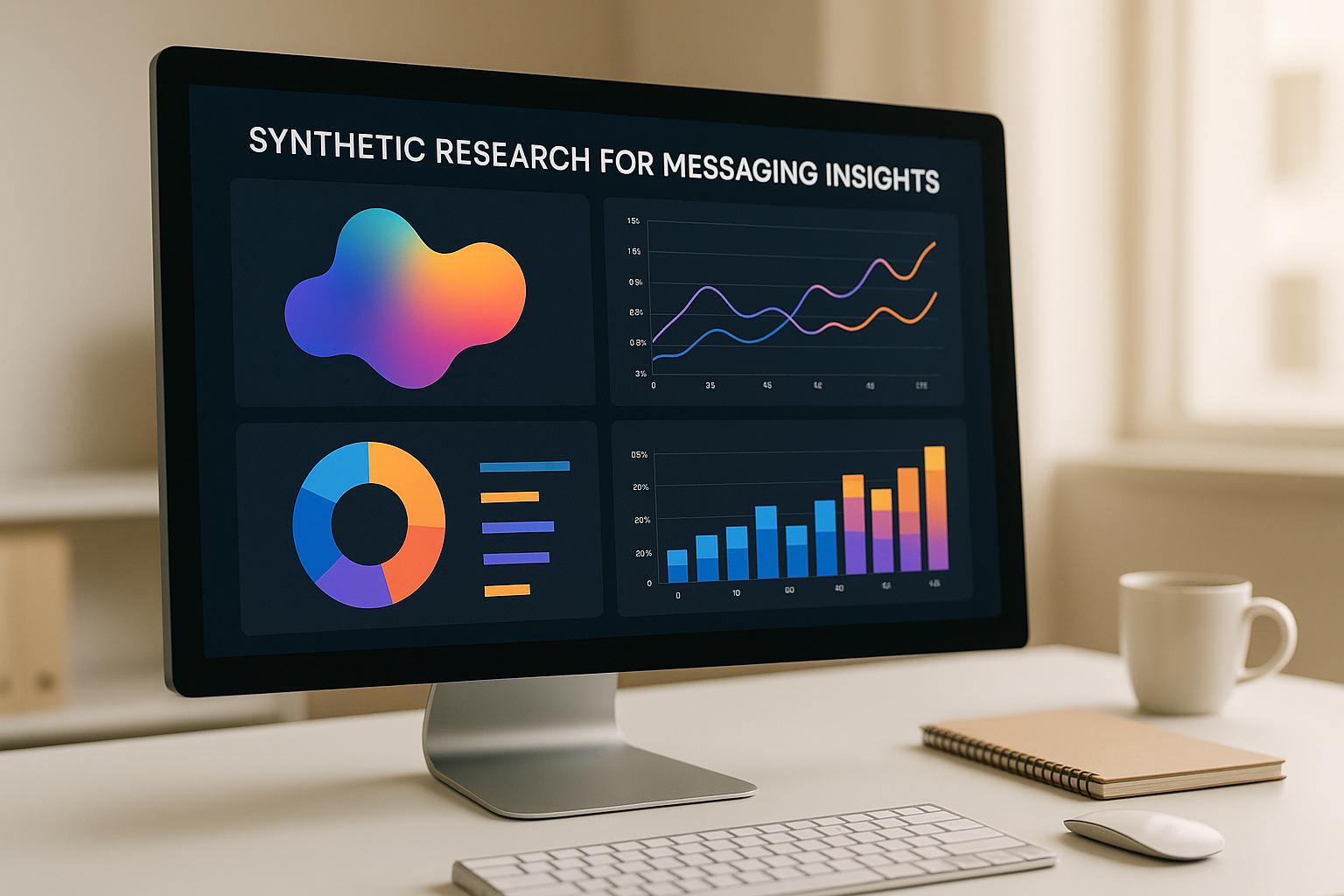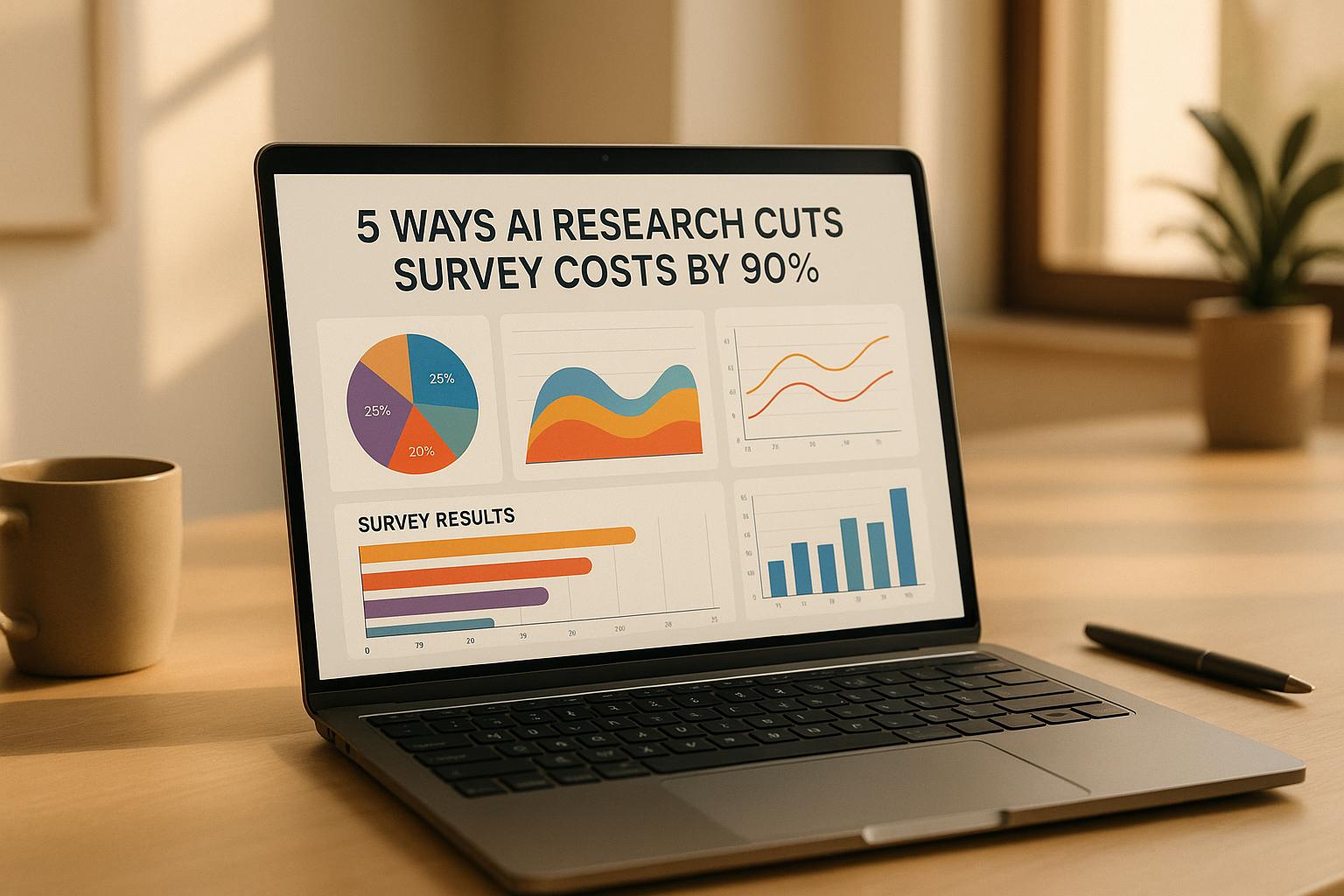AI is transforming how businesses make decisions by delivering faster, data-driven insights. Traditional research methods often fall short due to slow processes and limited scope. AI-powered tools now provide real-time analysis, uncover hidden trends, and simulate market scenarios, enabling companies to act quickly and reduce risks. Industries like healthcare, retail, and manufacturing use AI for predictive analytics, personalized marketing, and operational improvements. Platforms like Syntellia, which leverage synthetic respondents, are making high-quality insights accessible and cost-effective. The key takeaway? Companies that integrate AI into their decision-making processes are better equipped to stay competitive in today’s fast-changing markets.
How AI Changed Market Intelligence
AI has completely transformed the way businesses approach market intelligence, moving the process from being reactive to proactive. This evolution has replaced time-consuming traditional methods with faster, more efficient AI-powered insights.
From Manual Research to AI Insights
In the past, market research was a slow and expensive endeavor. Companies spent anywhere from $50,000 to $250,000 on a single study, often waiting 6 to 12 weeks for results. These delays made it difficult to conduct research frequently or respond quickly to market changes.
Now, AI has revolutionized this process. Automated tools can collect and analyze data in real time, allowing businesses to spot patterns and trends almost instantly. This shift not only saves time and money but also enables companies to make decisions based on up-to-date information.
Syntellia: Real-Time Insights with Synthetic Respondents

Platforms like Syntellia have taken AI-driven market research a step further. By using synthetic respondents - virtual models designed to replicate real consumer behavior with 90% accuracy - Syntellia delivers insights in just minutes. This approach eliminates the need for lengthy studies, making it possible for businesses to adapt quickly to consumer needs and market demands.
How Businesses Use AI Market Insights
Companies across various industries are tapping into AI-generated market insights to revolutionize how they make decisions. These insights go beyond relying on intuition or past data, offering real-time intelligence and predictive analytics to guide smarter choices.
Predictive Analytics for Forecasting and Product Development
AI-powered predictive analytics has become a game-changer for forecasting and product development. By analyzing vast amounts of data, businesses can anticipate demand and spot emerging trends. This helps them streamline inventory management, plan production schedules, and design products that align with future market needs.
In addition, AI allows teams to test and validate ideas or features more quickly, reducing risks and keeping research and development budgets in check. This efficient approach ensures resources are allocated where they’ll have the most impact.
AI has also transformed financial forecasting, enabling companies to predict revenue trends, seasonal shifts, and market changes with greater precision. This level of accuracy supports better budgeting, resource planning, and strategic decisions across all departments.
As mentioned earlier, platforms like Syntellia play a key role in speeding up these processes.
Personalized Marketing and Customer Engagement
AI insights are also reshaping how businesses connect with their customers. By analyzing behavioral data, preferences, and purchase histories, companies can create highly targeted marketing campaigns. These personalized messages resonate more with specific customer segments, driving higher engagement and conversion rates.
Customer segmentation has become much more refined with AI. Instead of relying on broad demographics, businesses can now identify micro-segments based on actual behavior and preferences. This allows for tailored messaging that addresses the unique needs and motivations of each group.
Another benefit is the ability to make real-time content adjustments. AI insights help marketers determine which messages, visuals, or offers are resonating with different audience segments. This means campaigns can be fine-tuned on the fly to maximize effectiveness and return on investment.
Email marketing also gets a boost from AI. By analyzing factors like optimal send times, subject lines, and content formats, companies can test different approaches and implement strategies that work best for their audience.
Social media strategies are similarly enhanced. AI insights help businesses identify the ideal posting times, content types, and engagement methods for various platforms. This data-driven approach fosters stronger customer relationships and builds brand loyalty.
Real-Time Competitor and Regulatory Monitoring
AI is equally valuable for keeping tabs on competitors and navigating regulatory environments. Businesses now use AI tools for continuous monitoring of competitor activities, pricing changes, and market positioning. This real-time data allows companies to respond quickly to competitive threats and seize opportunities to differentiate themselves in the market.
Pricing strategies have become more dynamic thanks to AI. By tracking competitor prices, demand patterns, and market conditions, businesses can adjust their pricing in real time to stay competitive while maximizing profits.
AI also simplifies regulatory compliance, especially in industries like healthcare, finance, and manufacturing where rules frequently change. By monitoring laws and standards, businesses can ensure they remain compliant, avoiding potential disruptions to operations.
Finally, AI insights help identify market opportunities by analyzing gaps in competitors’ offerings, emerging trends, and unmet customer needs. This enables businesses to act on opportunities for new products, services, or market expansions before their rivals do.
In short, AI insights empower companies to stay agile, competitive, and informed in a constantly evolving market landscape.
Industry-Specific AI Market Insight Applications
AI is transforming market research across industries, offering tailored solutions to address specific challenges and opportunities.
Consumer Goods: Real-Time Pricing and Personalized Campaigns
In the consumer goods sector, AI is driving smarter pricing strategies and more precise marketing. Dynamic pricing allows brands to adjust prices instantly based on factors like demand, competitor activity, and market trends. Retailers are even using AI to analyze external influences, such as weather conditions, local events, and social media sentiment, to fine-tune pricing decisions in real time.
Marketing has also reached new levels of personalization. Instead of relying on broad demographic categories, companies now create detailed micro-segments based on factors like buying habits, brand loyalty, and emotional responses. This enables brands to craft messages that genuinely connect with individual consumers. With real-time insights, brands can test, refine, and optimize campaigns on the fly, ensuring their strategies stay effective.
AI’s role doesn’t stop there. It’s also helping companies manage inventory more efficiently by predicting demand with greater accuracy. This reduces the risks of overstocking or running out of products, which is especially important for items with short shelf lives.
These advancements in consumer goods highlight how AI’s precision can also fuel breakthroughs in healthcare.
Healthcare: Accelerating Innovation and Streamlining Operations
In healthcare, AI is revolutionizing both research and operational efficiency. One major area of impact is clinical trial optimization, where AI identifies suitable patient populations and predicts trial outcomes with higher accuracy, speeding up the research process.
AI is also reshaping drug development. By analyzing unmet medical needs and assessing potential treatments, AI helps streamline development timelines, saving time and resources.
Operationally, hospitals are benefiting from AI’s ability to predict patient admission trends and resource requirements. This leads to better bed management and improved emergency department efficiency. Additionally, healthcare organizations are leveraging synthetic data to better understand patient preferences, communication styles, and treatment adherence. These insights enhance patient engagement strategies, improving health education and outcomes.
Given the strict regulatory landscape in healthcare, compliance is a critical focus. AI helps organizations stay up-to-date with changing regulations and proactively manage risks. For example, platforms like Syntellia use synthetic respondent data to provide insights with 90% accuracy while ensuring patient privacy.
This level of precision in healthcare sets the stage for industrial applications where operational excellence is key.
Industrial Products: Smarter Processes and Maintenance
In the industrial sector, AI is optimizing manufacturing and maintenance processes. Predictive maintenance is a standout application, with AI analyzing equipment performance to predict failures and prevent costly downtime. It’s also improving supply chain management by forecasting demand shifts and identifying potential disruptions before they occur.
AI is enhancing quality control by detecting production issues early and enabling faster corrective actions. It’s also driving energy efficiency by analyzing usage patterns and uncovering areas for improvement.
Customer service in industrial settings is benefiting, too. AI predicts client needs and streamlines service schedules, ensuring a smoother experience. Additionally, by simulating operational scenarios, companies can test potential changes and gather employee input before rolling them out. On the safety front, AI identifies risks, refines safety protocols, and evaluates training effectiveness - crucial for maintaining secure work environments.
With AI’s ability to tackle such diverse challenges, it’s clear that its applications are reshaping industries in profound ways.
sbb-itb-2b2bc16
Best Practices for AI Market Insights in Planning
Integrating AI-driven market insights into planning requires a clear focus and practical strategies. Companies that succeed in this area prioritize actionable goals and ensure their efforts yield measurable results.
Aligning AI Insights with Business Goals
The most effective AI initiatives start with well-defined objectives. Before diving into data collection, businesses should establish clear goals and determine how AI insights will contribute to achieving them. Every insight should tie directly to a specific outcome - whether it’s boosting market share, enhancing customer satisfaction, or cutting operational costs.
To make this connection, companies can use frameworks that link AI insights to business outcomes. For example, customer sentiment analysis might guide product development timelines, while competitive intelligence could shape pricing strategies. This approach helps avoid information overload and keeps efforts focused.
Regular stakeholder reviews, held quarterly, can help ensure AI insights remain aligned with shifting business priorities. Teams that consistently revisit their objectives and adjust their strategies tend to stay on track and deliver better results.
Collaboration across departments is another critical factor. Marketing teams might uncover customer preferences that inform product development, while operational data could highlight efficiency improvements that impact pricing. Breaking down silos can lead to unexpected insights and smarter decision-making.
Maintaining Data Quality and Privacy
The value of AI insights depends entirely on the quality of the data feeding them. Organizations need to prioritize accuracy, completeness, and relevance through strong data governance practices. This includes regular audits of data sources, validating synthetic data against real-world benchmarks, and continuously monitoring the quality of insights generated.
Privacy is also a top priority in today’s regulatory landscape. Companies must navigate complex privacy laws while still gathering useful data. Tools like Syntellia use synthetic respondents to deliver meaningful insights without compromising individual privacy.
To protect sensitive information, businesses should implement strict data security measures. This includes access controls, audit trails, and secure sharing protocols. Regular validation of AI accuracy is equally important. Comparing AI predictions with actual market outcomes allows organizations to refine their models and improve future performance. This constant cycle of improvement builds trust in AI-generated insights and ensures they remain reliable.
Continuous Strategy Development with Real-Time Insights
To maximize the benefits of AI in planning, businesses are shifting from annual strategic reviews to continuous strategy development powered by real-time insights. This shift allows for more dynamic and responsive decision-making.
AI-driven scenario testing is a key tool for adapting strategies quickly. By using real-time market intelligence, businesses can explore multiple scenarios to identify challenges and opportunities before they fully develop.
Real-time insights also enable businesses to adjust strategies on the fly. For example, if AI analysis detects changes in customer preferences or competitor actions, companies can respond immediately instead of waiting for the next scheduled planning cycle. This agility often results in quicker responses and a stronger market position.
Automated systems that deliver insights through alerts and dashboards further enhance decision-making. These tools ensure decision-makers have access to critical information exactly when they need it, fostering more proactive and effective strategies.
The ultimate goal is to create a feedback loop between AI insights and business outcomes. By tracking how AI-driven decisions perform in the real world, organizations can continually refine their strategies and improve how they interpret and apply insights. Combining clear objectives with strong data practices and agile planning transforms AI insights into a powerful competitive edge.
Conclusion: AI as the Future of Business Decision-Making
AI is reshaping the way businesses approach strategy. Nearly 90% of business leaders believe that AI is either central to their strategy now or will be within the next two years. This makes the real question not about whether to adopt AI, but about how quickly organizations can integrate it into their operations effectively.
The numbers tell a compelling story. By 2030, the global AI market is expected to reach $826.70 billion. Additionally, AI implementation could slash business costs by as much as 30% by 2035. These aren’t distant projections - they reflect a current shift that’s already transforming industries and competitive dynamics.
One of the driving forces behind this change is the rise of predictive and prescriptive analytics. Modern AI systems go beyond analyzing past data; they provide actionable recommendations for the future. This allows businesses to shift from reacting to problems to proactively planning strategies, leveraging the vast amounts of data that are shaping today’s markets.
And the data? It’s staggering. Over 90% of the world’s data has been created in just the past two years, with more than 2.5 quintillion bytes generated daily. Traditional research simply can’t keep up. Platforms like Syntellia highlight the importance of real-time insights, which are essential in today’s fast-moving business environment.
Yet, technology isn’t the sole driver of success. The most successful companies recognize the value of combining AI’s analytical power with human judgment, creativity, and emotional intelligence. AI can process enormous amounts of data, but human insight is crucial for interpreting it and applying it effectively. The future belongs to businesses that strike the right balance between the two.
Equally important is governance. As AI capabilities continue to accelerate, companies must address challenges like data privacy, algorithmic bias, and transparency. Building AI-ready data infrastructures, implementing strong governance frameworks, and investing in skilled professionals will be critical for capitalizing on future opportunities.
AI is redefining how businesses plan, engage with customers, and position themselves in the market. Companies that embrace this transformation will lead the way in an increasingly data-driven world.
FAQs
How does AI make market research faster and more accurate than traditional methods?
AI is reshaping market research by handling and analyzing massive datasets with incredible speed and accuracy. Tasks that once took days - or even weeks - using traditional methods can now be completed in just minutes.
With the help of advanced algorithms, AI achieves accuracy rates as high as 90%, all while cutting down costs and time significantly. This means businesses can act on insights faster, anticipate market changes more effectively, and adjust their strategies with greater certainty.
What are synthetic respondents, and how do they help generate real-time market insights?
Synthetic respondents are virtual participants powered by AI, crafted to mimic human feedback. Using advanced algorithms, they can process and respond to survey questions swiftly, offering insights in just minutes.
These tools empower businesses to evaluate messaging, confirm strategies, and fine-tune decisions with impressive speed and precision. Their capacity to deliver real-time data ensures companies can adapt quickly and make well-informed choices in fast-changing markets.
How can AI-driven insights transform industries like healthcare and manufacturing?
AI-powered insights are transforming industries by making decisions sharper and quicker. Take healthcare, for example - AI is streamlining diagnostics, tailoring treatment plans to individual patients, and cutting through administrative red tape. The result? Improved patient care and smoother operations. In manufacturing, AI is fine-tuning production workflows, predicting equipment issues before they happen, and improving quality control. These developments are helping businesses run smarter and stay ahead in an ever-changing landscape.


